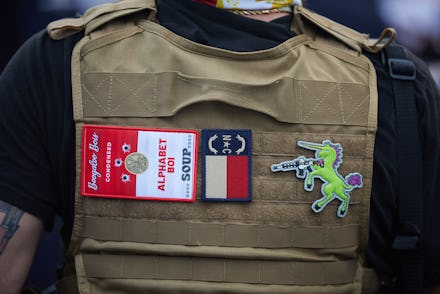The Boogaloo movement is heavily armed and itching for another civil war

This week, federal prosecutors announced that they had charged Steven Carrillo with murder and attempted murder for the killing of Security Officer David Patrick Underwood outside a courthouse in Oakland, California, on May 29. While the FBI claims Carrillo, a 32-year-old staff sergeant in the U.S. Air Force, is the gunman who "allegedly fired multiple rounds from a firearm toward the guard post" out the passenger side of a moving van, their allegations against Carrillo hint at an even darker layer of the drive-by shooting, involving the nebulous, ill-defined Boogaloo movement.
Per the Department of Justice's press release announcing the charges:
Carrillo appears to have used his own blood to write various phrases on the hood of the car that he carjacked. The phrases relate to an extremist ideology that promotes inciting a violent uprising through use of militias.
That "ideology" they're referring to is the Boogaloo group.
With its roots in 4Chan's free-wheeling, weapons-focused /k/ message board, the Boogaloo movement derives its name from the 1984 breakdancing movie Breakin' 2: Electric Boogaloo. For adherents, the fact that Breakin' 2 is a sequel film is the point — only their boogaloo isn't about dancing, it's about a second civil war, and the overthrow of the U.S. government.
It's important to note that the movement — decentralized, discordant, and nebulous as it is — seemingly takes pains to present itself outwardly as neither racist nor aligned with the traditional left-right political spectrum. As internet investigators Bellingcat notes:
On the Facebook page, Big Igloo Bois, which at the time of writing had 30,637 followers, an administrator wrote of the protests, “If there was ever a time for bois to stand in solidarity with ALL free men and women in this country, it is now.”
They added, “This is not a race issue. For far too long we have allowed them to murder us in our homes, and in the streets. We need to stand with the people of Minneapolis. We need to support them in this protest against a system that allows police brutality to go unchecked.”
In truth, the ideology — which has been existed in some form for the better part of the decade — frequently venerates the long history of anti-government right-wing movements, paying homage to several notable figures from the past several decades of militias in the U.S. But with Boogaloo itself having crystalized explicitly online, the movement is rife with the sort of cheeky in-jokes that mask its darker intent. Adherents sometimes wear Hawaiian shirts, as a sign of the intentional malapropism "Big Luau," or other similar variations.
"This is a very violent movement, even if they are wearing Hawaiian shirts and using funny memes to try to soften what they are doing,” militia and racist movement expert professor Kathleen Belew explained to The New York Times.
Distilled to its purest essence, the Boogaloo movement is fixated on the overthrow and replacement of the U.S. government. As the Southern Poverty Law Center explains:
Within the far right, racist concepts and conspiracy theories are often laundered and adopted by groups with a more mainstream aesthetic and less overtly racist aims than their original creators. For instance, the term “white genocide” has now given way to “the great replacement” to describe the idea that white people are being systematically replaced by non-whites in Western countries. This makes extreme ideas more palatable for a mainstream audience. The Boogaloo seems to have undergone a similar sanitation process. As it expanded across the far right, it took on a multiplicity of meanings. But, at its core, the Boogaloo has always remained a reference to mass civil conflict or civil war — it’s just that who is on either side of the battle lines can be murky.
Still, with its genesis from the same 4Chan-y swamps that inspired the racist shooting of protesters outside a Minneapolis police precinct in 2015, and its place in the liminal, amorphic world of digital insurrectionist, accelerationist, and anti-government spheres, the Boogaloo ideology remains closely associated with the more overtly racist elements of the country's tapestry of militia movements. It's an association explicit white nationalists and neo-Nazis seem eager to capitalize on, appropriating the term to describe a race war, specifically.
Of late, Boogaloo adherents have seized upon the country-wide protests around police brutality and social justice, as well as the ongoing coronavirus pandemic, using the moments of civil unrest to further their own violent agenda.
"The Department of Justice stands in support of all Americans exercising their First Amendment rights to peaceable assembly and speech," Assistant Attorney General for National Security John C. Demers said in a statement after Carrillo was arrested and charged. "But we stand firmly against anyone who seeks to hijack the protests with acts of violence and destruction.”